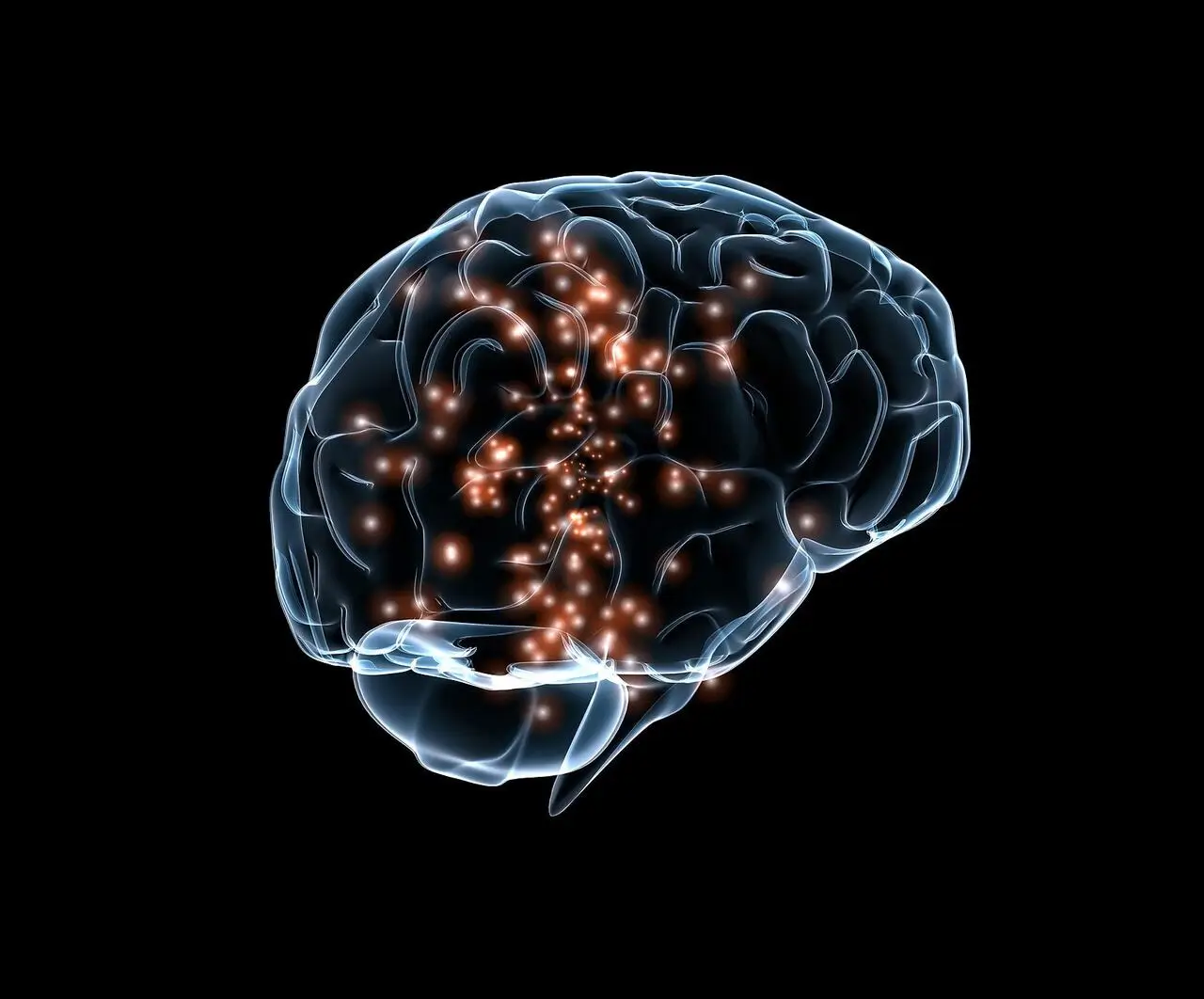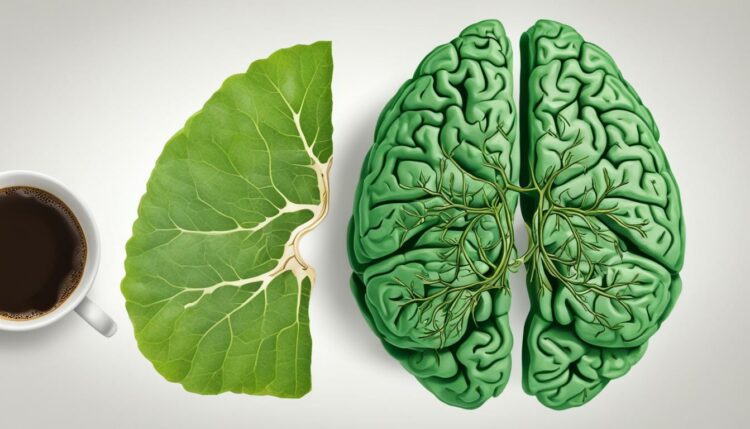L-theanine and coffee have long been revered for their individual cognitive benefits. L-theanine, an amino acid found in green tea, has been shown to enhance attention and cognitive function.
Coffee, on the other hand, is known for its stimulating effect on the brain. But did you know that combining L-theanine and coffee can have a synergistic effect on cognitive performance?
When L-theanine and coffee are consumed together, they work together to improve attention, focus, and overall cognitive function. L-theanine acts as a glutamate reuptake inhibitor and a competitive low-affinity glutamate receptor antagonist, enhancing cognitive performance and providing neuroprotective effects.
Caffeine inhibits adenosine receptors in the brain, increasing cholinergic and dopaminergic transmission, which improves attention.
Key Takeaways:
- The combination of L-theanine and coffee can enhance cognitive performance
- L-theanine improves attention by acting as a glutamate reuptake inhibitor and glutamate receptor antagonist
- Coffee improves attention by inhibiting adenosine receptors and increasing cholinergic and dopaminergic transmission
- Consuming L-theanine and coffee together can provide a powerful cognitive boost
- The combination is especially beneficial for individuals with ADHD or those seeking to optimize their cognitive abilities
Understanding ADHD and Cognitive Deficits
ADHD, or attention-deficit hyperactivity disorder, is a neurodevelopmental disorder that affects individuals of all ages. It is characterized by impaired attention, hyperactivity, and increased impulsivity.
One of the key aspects of ADHD is the presence of cognitive deficits. These deficits impact various cognitive domains, including:
- Sustained attention: Individuals with ADHD may struggle to maintain attention on a specific task or activity for an extended period.
- Impulse control: Impulsivity is a common symptom of ADHD, leading individuals to act without considering the consequences.
- Executive functions: Working memory, task-switching, and problem-solving abilities may be impaired in individuals with ADHD.
These cognitive deficits can significantly impact daily functioning and academic performance, making it crucial to understand and manage them effectively.
ADHD is often associated with difficulties in inhibitory control, which refers to the ability to regulate or suppress impulsive behavior and maintain focus. Individuals with ADHD may struggle with self-control, leading to challenges in staying on task, organizing thoughts, and following instructions.
Managing Cognitive Deficits in ADHD
Addressing cognitive deficits is an essential aspect of managing ADHD and improving overall functioning. Effective strategies and interventions can help individuals with ADHD develop coping mechanisms and improve their cognitive abilities. Some approaches for managing cognitive deficits in ADHD include:
- Education and awareness: Understanding the specific cognitive challenges associated with ADHD can help individuals and their families develop appropriate strategies and accommodations.
- Cognitive-behavioral therapy: Therapies such as CBT can help individuals with ADHD learn strategies to manage impulsivity, improve organization and time management skills, and enhance attention and focus.
- Medication: In some cases, medication may be prescribed to address cognitive deficits associated with ADHD. Stimulant medications, such as methylphenidate, can help improve attention and impulse control.
- Environmental modifications: Creating a structured environment and implementing organizational tools can help individuals with ADHD manage their cognitive deficits more effectively.
Individuals with ADHD often have unique strengths and talents. By focusing on these strengths and finding strategies to manage cognitive deficits, individuals with ADHD can thrive and reach their full potential.
By addressing the cognitive deficits associated with ADHD, individuals can improve their attention, focus, and overall cognitive functioning. This, in turn, can have a positive impact on various aspects of their lives, including academics, work, and relationships.
Understanding the Impact
The cognitive deficits associated with ADHD can have far-reaching effects on individuals’ lives. Difficulties with attention and impulsivity can make it challenging to complete tasks, stay organized, and maintain relationships.
Academic performance may also suffer, as individuals with ADHD may struggle with concentration, memory, and information processing.
Addressing these cognitive deficits is essential for individuals with ADHD to succeed academically, professionally, and socially. Effective management strategies, support systems, and appropriate interventions can help individuals overcome these challenges and unlock their full potential.
| Cognitive Domains | Impact of Cognitive Deficits in ADHD |
|---|---|
| Sustained attention | Difficulty maintaining focus on tasks or activities |
| Impulse control | Tendency to act without considering consequences |
| Executive functions | Challenges in working memory, task-switching, and problem-solving |
The table above provides a summary of the cognitive domains affected by ADHD and the corresponding impact on individuals’ cognitive functioning. Understanding these deficits and their consequences is fundamental to developing effective interventions and support for individuals with ADHD.
With the right strategies, support, and interventions, individuals with ADHD can learn to navigate and overcome their cognitive deficits. By acknowledging and addressing these challenges, individuals with ADHD can lead fulfilling lives and achieve their goals.
Effects of L-theanine and Caffeine on Cognitive Function in ADHD
Several clinical trials have investigated the cognitive-enhancing effects of L-theanine and caffeine in individuals with ADHD. The combination of L-theanine and caffeine has shown promising results in improving attention and overall cognitive function.
In one study, researchers found that the fusion of L-theanine and caffeine significantly improved the total cognition composite, inhibitory control, and attention in boys diagnosed with ADHD. This suggests that the combination of these two compounds can enhance cognitive performance and attention in individuals with ADHD.

Another clinical trial demonstrated that L-theanine and caffeine together reduce task-related reactivity in the default mode network of the brain. By decreasing distractibility and promoting concentration, this combination can effectively improve cognitive function in individuals with ADHD.
The results of these clinical trials indicate that L-theanine and caffeine fusion can have a positive impact on cognitive enhancement and attention improvement, making it a promising option for individuals with ADHD seeking cognitive support.
Key Findings:
- Combining L-theanine and caffeine improves total cognition composite, inhibitory control, and attention in individuals with ADHD.
- L-theanine and caffeine decrease task-related reactivity in the default mode network of the brain, leading to decreased distractibility and improved concentration.
Based on these findings, L-theanine and caffeine have the potential to be valuable additions to cognitive support strategies for individuals with ADHD.
| Study | Effects of L-theanine and Caffeine on Cognitive Function in ADHD |
|---|---|
| Participants | Boys diagnosed with ADHD |
| Intervention | Combination of L-theanine and caffeine |
| Outcomes | Improved total cognition composite, inhibitory control, and attention |
| Brain Activation | Decreased task-related reactivity in the default mode network |
Mechanisms of Action for L-theanine and Caffeine
L-theanine and caffeine, when taken together, exhibit synergistic effects that enhance cognitive function, particularly attention. Let’s explore the specific mechanisms of action for these compounds and how they contribute to improved cognitive performance.
The Role of L-theanine
L-theanine acts as a glutamate reuptake inhibitor and a competitive low-affinity glutamate receptor antagonist. By inhibiting glutamate reuptake, L-theanine increases the availability of this neurotransmitter in the brain, promoting neuronal communication and enhancing cognitive function.
Additionally, as a glutamate receptor antagonist, L-theanine blocks the excessive activation of glutamate receptors, preventing excitotoxicity and supporting cognitive health.
The Impact of Caffeine
Caffeine, on the other hand, exerts its cognitive-enhancing effects by inhibiting adenosine receptors types A1 and A2a in the brain. Adenosine receptors play a role in regulating cholinergic and dopaminergic transmission, which are crucial for attention.
By inhibiting these receptors, caffeine increases the release of acetylcholine and dopamine, leading to heightened cholinergic and dopaminergic transmission. This, in turn, promotes alertness, attention, and cognitive performance.
The combined actions of L-theanine and caffeine create a powerful synergy that improves attention and cognitive function. L-theanine optimizes glutamate signaling, while caffeine enhances cholinergic and dopaminergic transmission, resulting in heightened cognitive abilities.
“The combination of L-theanine and caffeine creates a powerful synergy, optimizing attention and cognitive function.”
| Mechanism of Action | Effect on Cognitive Function |
|---|---|
| L-theanine as a glutamate reuptake inhibitor | Increases glutamate availability, promoting neuronal communication |
| L-theanine as a glutamate receptor antagonist | Prevents excessive glutamate receptor activation, protecting against excitotoxicity |
| Caffeine as an adenosine receptor inhibitor | Enhances cholinergic and dopaminergic transmission, promoting attention |
Safety and Tolerability of L-theanine and Caffeine
When considering the combination of L-theanine and caffeine for cognitive enhancement, it is essential to assess the safety and tolerability of these substances. Both L-theanine and caffeine have been extensively studied and are generally considered safe when taken orally.
Studies have examined L-theanine at doses up to 400 mg per day without significant adverse effects. In fact, the overwhelming majority of participants reported minimal side effects, with only one case of facial tics reported.
Caffeine, even at moderate doses, is also well-tolerated by most individuals. The most commonly reported adverse effects of caffeine intake include mild symptoms such as temporary loss of appetite and irritability.
Interestingly, when taken together, L-theanine has been found to counteract some of the adverse effects associated with caffeine consumption. For example, the combination has been shown to mitigate caffeine-induced sleep disturbances, making it a suitable option for those concerned about disrupting their sleep patterns.

Overall, the combination of L-theanine and caffeine is considered safe and unlikely to result in adverse events. Nevertheless, it is essential to note that individual responses to these substances may vary.
It is always recommended to consult with a healthcare professional before making any significant changes to your dietary supplementation or caffeine intake.
Dosage and Recommendations for L-theanine and Coffee Combination
When it comes to optimizing the benefits of L-theanine and coffee, finding the right dosage is key. The optimal dosage of L-theanine and caffeine may vary depending on individual tolerance, desired effects, and the specific product being used.
In clinical trials, the doses of L-theanine ranged from 2.5 mg/kg to 400 mg/day, while caffeine doses ranged from 2 mg/kg to 200 mg. However, it is essential to note that individual responses to the combination of L-theanine and caffeine may differ.
Therefore, it is recommended to start with lower doses and gradually increase them as needed while monitoring for any adverse effects.
If you prefer a convenient and precise method of dosing, consider combining a L-theanine supplement with your daily cup of coffee. This can be achieved by consuming a cup of coffee along with a L-theanine supplement, ensuring you’re getting the optimal dose of both compounds simultaneously.
Alternatively, you can also opt for drinking green tea. Green tea naturally contains both L-theanine and caffeine, allowing you to enjoy the synergistic effects of this powerful cognitive-boosting combination.
The right dosage and combination of L-theanine and coffee can help you unlock their full potential in enhancing cognitive performance and boosting your focus.
Whether you prefer the supplement route or the natural green tea option, finding the dosage that works best for you is essential in experiencing the cognitive enhancement benefits of L-theanine and coffee.
Conclusion
The combination of L-theanine and coffee synergistically enhances cognitive performance and promotes cognitive enhancement. L-theanine, with its ability to inhibit glutamate reuptake and compete with low-affinity glutamate receptors, improves attention and overall cognitive function.
Caffeine, through its inhibition of adenosine receptors and increased cholinergic and dopaminergic transmission, further enhances attention. When used together, L-theanine and caffeine provide a powerful cognitive boost, improving focus and cognitive abilities.
Whether you have ADHD or simply want to optimize your cognitive performance, incorporating L-theanine and coffee into your daily routine can have significant benefits. The synergy between these two compounds enhances attention, improves cognitive function, and helps you perform at your best.
By including this combination in your lifestyle, you can potentially experience improved cognitive performance and enhanced daily functioning.
In summary, L-theanine and coffee work together to enhance cognitive performance, providing a natural and effective solution for cognitive enhancement. Their synergistic effects make them a valuable tool in improving attention, focus, and overall cognitive function.
Consider integrating L-theanine and coffee into your daily routine to unlock your full cognitive potential and optimize your mental abilities.
FAQ
What are the benefits of combining L-theanine and coffee?
The combination of L-theanine and coffee enhances cognitive function, particularly attention, providing a powerful cognitive boost. It improves focus, concentration, and overall cognitive performance.
Can L-theanine and caffeine help with ADHD and cognitive deficits?
Yes, L-theanine and caffeine have been found to effectively enhance cognitive function in individuals with ADHD. They improve attention, inhibitory control, and other cognitive domains affected by ADHD.
How do L-theanine and caffeine work to improve cognitive function?
L-theanine acts as a glutamate reuptake inhibitor and a competitive low-affinity glutamate receptor antagonist, while caffeine inhibits adenosine receptors and increases cholinergic and dopaminergic transmission. These combined actions enhance attention and cognitive function.
Are L-theanine and caffeine safe to consume together?
Yes, both L-theanine and caffeine are considered safe and well-tolerated when taken orally. The combination of L-theanine and caffeine has been shown to negate the adverse effects of caffeine, such as sleep disturbances.
What is the optimal dosage for L-theanine and caffeine?
The optimal dosage depends on factors such as individual tolerance and desired effects. In clinical trials, doses of L-theanine ranged from 2.5 mg/kg to 400 mg/day, while caffeine doses ranged from 2 mg/kg to 200 mg. It is recommended to start with lower doses and gradually increase as needed.
How can I combine L-theanine and coffee?
You can combine L-theanine and coffee by consuming a cup of coffee along with a L-theanine supplement or by drinking green tea, which naturally contains both L-theanine and caffeine.
What is the synergy between L-theanine and coffee for cognitive performance?
The combination of L-theanine and coffee synergistically enhances cognitive performance. L-theanine improves attention and cognitive function, while caffeine increases cholinergic and dopaminergic transmission, resulting in improved focus, attention, and cognitive function.




